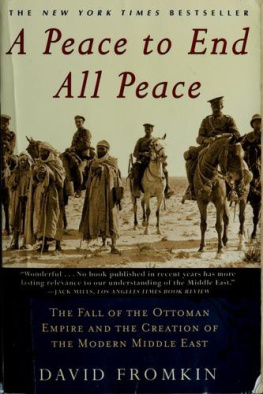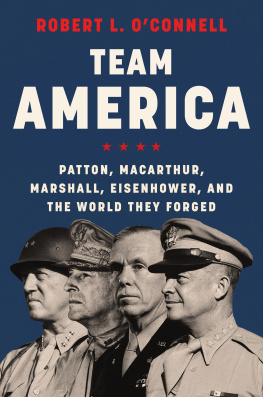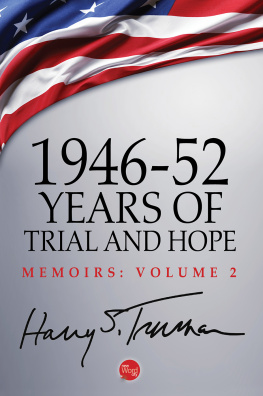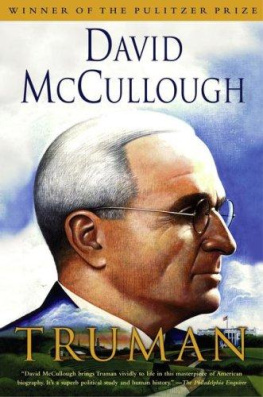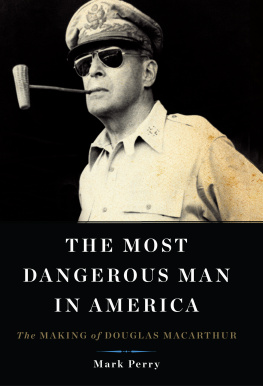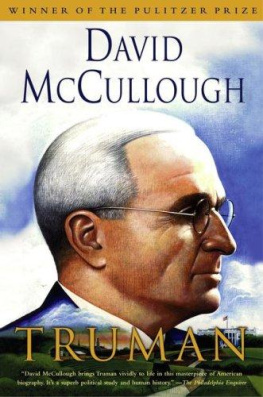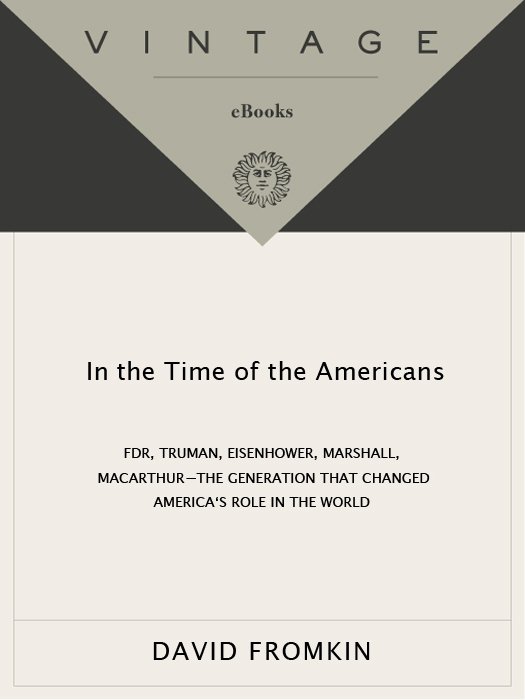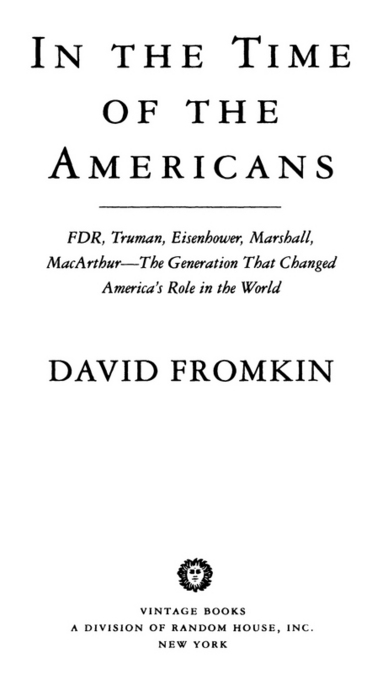ACCLAIM FOR David Fromkins
In the Time of the Americans
The story of a generation, a hugely ambitious effort to chronicle the United States emergence from isolationism. [Fromkin] succeeds admirably. He makes it vividly understandable how two world wars could be fought in 30 years. He follows the story relentlessly, enriching it with the foibles and conflicts of a generation blessed with extraordinary characters.
Chicago Tribune
A fascinating narrative history of the generation that was born at the end of the Indian wars and forged World War I. [Fromkin] sets out to write a popular history for the general audience, and succeeds brilliantly. [It] rings with authority and impresses with its intellectual sweep.
Wall Street Journal
Fromkin possesses a fine sensibility for storytelling and the individual human drama embedded in large world events and he does so with grace and genuine insight. It is all very noisy and lots of fun to read.
Washington Post Book World
[Fromkin has] a gift for explaining complex ideas and events in accessible prose, and a palpable passion for his subject.
Los Angeles Times
Fromkin is a deft, evocative writer [retelling] the grand tale of Americas emergence as a world power with verve and a narrative drive that keeps the reader engaged.
Newsday
[In the Time of the Americans] succeeds in making one whole story out of the manifold events of a half-century. It will be valuable in many a course in American history.
Christian Science Monitor
David Fromkin
In the Time of the Americans
David Fromkin is Professor of International Relations, History, and Law at Boston University, where he also serves as chairman of the International Relations Department and director of the Center for International Relations. His A Peace to End All Peace, a bestseller in paperback, was selected by The New York Times Book Review as one of the thirteen best books of 1989.
ALSO BY David Fromkin
The Question of Government
The Independence of Nations
A Peace to End All Peace
FIRST VINTAGE BOOKS EDITION, MAY 1996
Copyright 1995 by David Fromkin
All rights reserved under International and Pan-American Copyright Conventions. Published in the United States by Vintage Books, a division of Random House, Inc., New York, and simultaneously in Canada by Random House of Canada Limited, Toronto. Originally published in hardcover by Alfred A. Knopf, Inc., New York, in 1995.
Grateful acknowledgment is made to the following for permission to reprint previously published and unpublished material:
Houghton Mifflin Company: Excerpts from Public Philosopher: Selected Letters of Walter Lippmann, edited by John Morton Blum, copyright 1985 by John Morton Blum; excerpts from Turbulent Era: A Diplomatic Record of Forty Years, 19041945, by Joseph C. Grew, edited by Walter Johnson, copyright 1952 by Joseph C. Grew, copyright renewed 1980 by Elizabeth Lyon, Anita J. English, and Lilla Levitt. Reprinted by permission of Houghton Mifflin Company. All rights reserved.
Yale University Library: Diary entries for Sept. 29, 1917, Oct. 13, 1917, Dec. 18, 1917, Dec. 30, 1917, Jan. 3, 1918. Edward M. House Papers, Manuscripts and Archives, Yale University Library.
The Library of Congress has cataloged the Knopf edition as follows: Fromkin, David.
In the time of the Americans: FDR, Truman, Eisenhower, Marshall, MacArthur
the generation that changed Americas role in the world / by David Fromkin.
p. cm.
Includes bibliographical references.
eISBN: 978-0-307-76606-9
1. United StatesForeign relations20th century.
I. Title.
E744.F865 1995
327.73dc20 94-30100
Random House Web address:
http://www.randomhouse.com
v3.1
To John and Martha Watts
who make it all worthwhile
C ONTENTS
A N OTE TO THE R EADER
T HIS IS THE STORY of the American leaders who defined Americas role in the international politics of the twentieth century: Franklin Roosevelt, Truman, Eisenhower, Marshall, MacArthur, and their contemporaries. I see them as forming a coherent generation, shaped by shared experiences that brought them to see events from a common point of view. Historians often say that it is unscientific to think in terms of generations; but I think that in this case it helps to do so.
Born in the 1880s, FDR and his peers were old enough to fight in the First World War and to command in the Second. They changed their political enthusiasms and allegiances often as they rode the roller coaster that was at the same time the history of the twentieth century and their education.
They were offered a rare opportunity. Only a few times before in the history of the human race had a people been privileged to hold sway over much of the surrounding world. The handful of others mostly pursued traditional goals of gold and glory; but the Americans made use of the chance that came their way to try to change the political ways of the world. We will look into the upbringing that made them conceive that to be their mission, and we will ask what made them think that it was something that could be done.
This is not a full-scale history of the period. Nor is it a rounded generational history, describing in detail what FDR and his contemporaries wore and ate and drank and read and thought. It is focused uniquelyand in that sense narrowlyon their changing views about what Americas role in the world ought to be.
The book is written for the general reader. It is not, for the most part, based on primary sources. It is a work of storytelling and of interpretation. I have undertaken original research only in the few instances, such as the drafting history of Wilsons Fourteen Points, where I could not make sense of the existing accounts.
I have studied a respectable amount of the secondary literature, but nowhere near all or even most of it: it is too vast. I have had to be selective. Whenever forced to make choices, I have gone to the most recent sources based on the latest scholarship.
In trying to keep to a narrative path through the luxuriant overgrowth of information about Americas twentieth century, I have followed and kept in sight several torchbearers to light up the way: characters who appear at times in the pages that follow, mostly to show where their generation was going. William Bullitt, in particular, has much more space devoted to him than his intrinsic historical importance would justify. He is here so often because when important things were happening, he so often was there.
Then, too, Bullitt was emblematic. His twists and turns were typical of liberal Americans in his generation, or at least of those who took a keen interest in world affairs. He was pro-Wilson and then anti-Wilson; he ran the gamut of opinions about communist Russia; and he was a stubborn isolationist and a passionate interventionist.
I wanted this to be a shorter book, but couldnt manage it: there was too much ground to cover. Americans of FDRs generation witnessed much of the world history of the twentieth centurywars, revolutions, market crashes, the collapse of empiresand took part in most of it. They had far more than their share of being where the action was.


